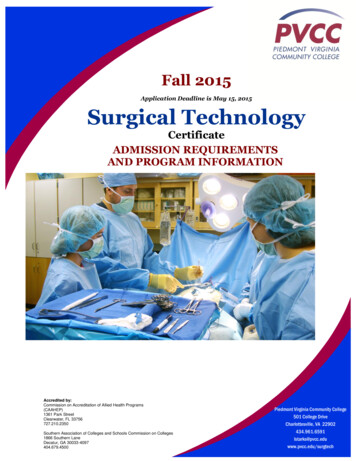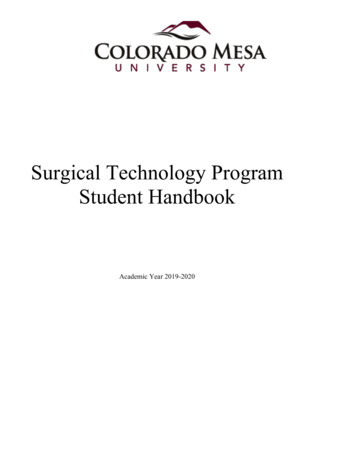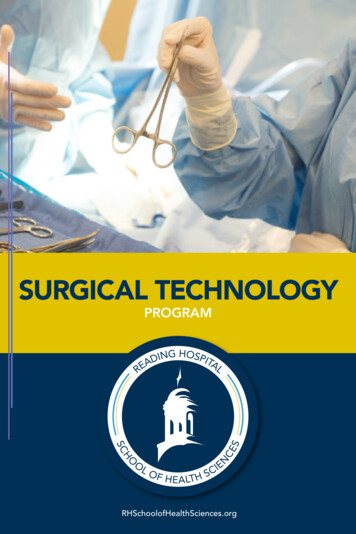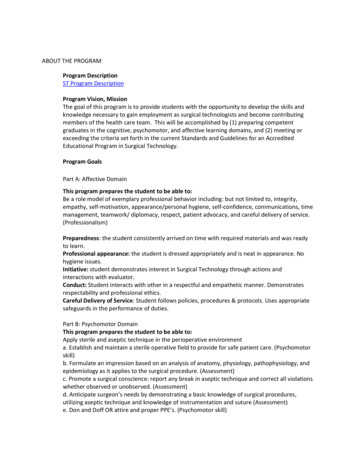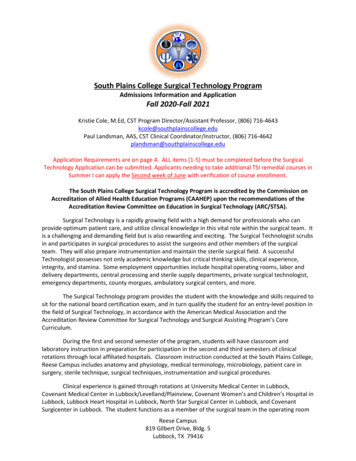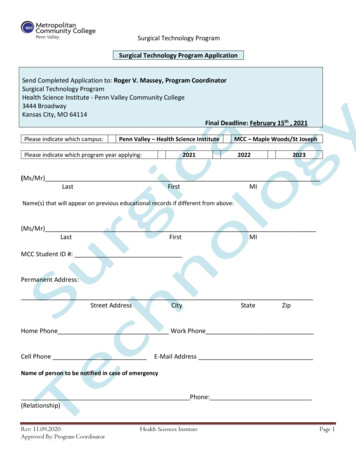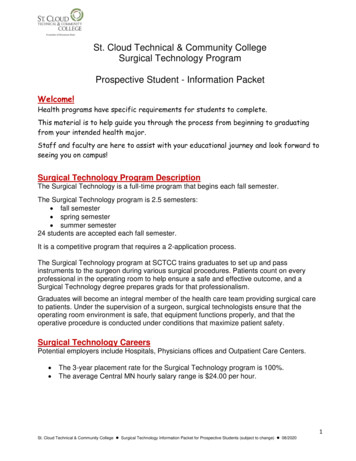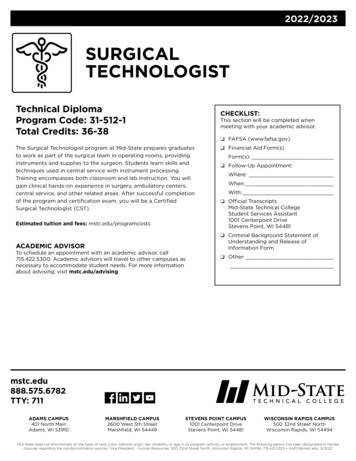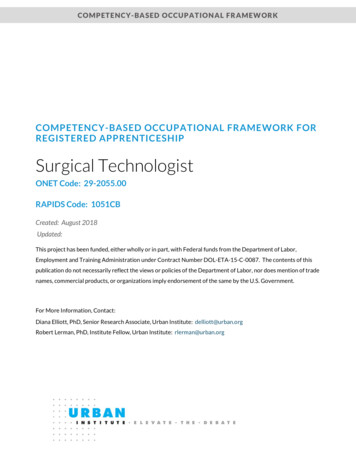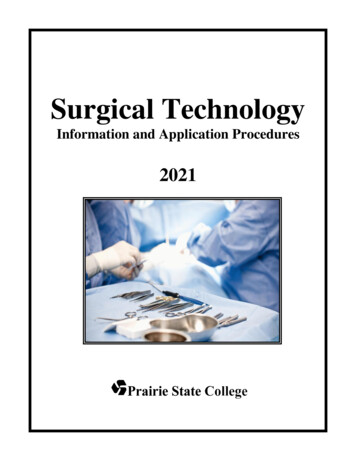
Transcription
Surgical TechnologyInformation and Application Procedures2021
SURGICAL TECHNOLOGY INFORMATIONHave you been thinking about a career in the medical field? Thought about nursing but didn’t feel it wasthe direction you wanted to follow? Perhaps you should consider Surgical Technology.A Surgical Technologist works under medical supervision and is a member of the operating room team.This individual ensures that the operating room environment is safe, that the equipment functionsproperly, and that the operative procedures are conducted under conditions that maintain sterility andmaximize patient safety.As a Surgical Tech student, you will also be trained to set up an operating room for each case. You willbe trained to prepare instruments and the proper procedures to follow during surgery, e.g., handinginstruments to the surgeon and their assistants. Training will also include breaking down the operatingroom, and preparing for the next case.An Associate of Applied Science degree in Surgical Technology earned from Prairie State College allowsyou to work in the operating room, surgical centers, labor and delivery, sterile processing and surgeon’soffices.Surgical Technology AAS Degree ProgramThe PSC Surgical Technology Program is accredited by the Accreditation Review Counsel of Educationin Surgical Technology and Surgical Assisting (ARC/STSA) and accredited by the Commission onAccreditation of Allied Health Education Programs (CAAHEP) for the AAS program, October 2018.The Surgical Technology program at Prairie State College is an Associate of Applied Science degreeprogram. It will take one year to complete the core curriculum. The general education courses will takeapproximately one year to complete prior to the program beginning. It is HIGHLY RECOMMENDED(although NOT mandatory) that you complete those general education courses before applying to theSurgical Technology program. Because of the intensive clinical aspect of the program, it is essentially aforty-hour week which would include both classes and clinicals. The Surgical Technology program is athirteen (13) month full time program, which begins in July of each year, completing in mid-July thefollowing year. This program is only offered as a full time, day time program.Clinicals will be held in hospital operating rooms with the student working with a preceptor. Studentsmust have their own transportation to travel to any one of over a dozen hospitals in a 45-mile radius.Upon completion of the thirteen (13) month core curriculum and all general education courses requiredfor the AAS degree, students my sit for the certification exam offered by the National Board of SurgicalTechnology and Surgical Assisting. Upon successful completion of the certification exam, the titleCertified Surgical Technologist (CST) can be used.Essential Functional Abilities of a Surgical TechnologistStudents in the surgical technology program are required to learn and consistently apply theoreticalconcepts and completely demonstrate psychomotor skills. The essential functional abilities (see page 2)reflect the required attributes of the surgical technologist. If a student demonstrates difficulty in eitherthe theoretical or psychomotor area, early intervention and remediation will be instituted by faculty. Ifthe student continues to be unable to consistently perform the essential functions in the clinical setting, itwill be necessary to terminate the student’s participation in the clinical component. Students cannotcomplete the program without successful completion of both classroom and clinical course work.Students dismissed from the program for failure to acquire and maintain the essential functional abilitieswill not be allowed to reapply to the surgical technology program.Page 1C:\Users\staele2\Downloads\Information and Application Procedures 20210111.docxrevised-20210111
Essential Functional Abilities of a SurgicalTechnologistSurgical technologists must be in good health. Attendance at both the classroom and clinical agencies is vital to the student’s success. Other critical abilities thesurgical technologist should possess are:Motor CapabilityMove from room-toroom and maneuver insmall spaces.Squat,stoop/bend,reach above shoulderlevel, use standingbalance.Sensory CapabilityCoordinate verbal and manualinstructions.Communication AbilityCommunicate effectively inEnglish with patients, families,and other health care teammembers, both verbally and inwriting.Auditory ability sufficient to hearEffectivelyadaptverbal communication from patients communication both verballyand members of the health careand in writing to the intendedteam; includes the ability to respond audience.to emergency situations*Lift 50 pounds and exertup to 100 pounds force topush/pullDiscern soft sounds in afrequently noisy environment.*Use hands repetitively;use manual dexterity; anddemonstrate fine motorskills.Visual acuity to safely execute theresponsibilities of the surgicaltechnologist, safely handle sharps,and passing instruments.*Must be able to standfor long periods oftime (6-8 hours).Comfortable working in closeproximity to the patient and othermembers of the health care team.Perform CPR as needed.Travel to and from theacademic and clinicalsites.Behavioral Skills andProfessionalismProblem Solving AbilityFunction effectively under Arrive to class on time,stress.prepared for the day.Respond appropriately toemergency situations.Consistently demonstratematurity and the ability toperform the duties of asurgical technologist.Interact; establish rapport withother members of the health carteam and patients from avariety of social, emotional,cultural, and intellectualbackgrounds.Assume the role of a health careteam member.Adhere to infectioncontrol policies andprocedures andconsistentlydemonstrate surgicalconscience.Demonstrate problemsolving skills in theoperating room, andpatient care.Consistentlydemonstrates surgicalconscience.Functions effectively under thesupervision of other health careteam members.Uses sound judgementand safety precautions.Demonstrates preparednessfor the classroom and dailyclinical assignments.Sufficient command of theEnglish language to retrieveinformation from lectures,textbooks, websites, andunderstand medicalterminology.Basic computer skills including:e- mail and Internet access.Addresses problems orquestions to theappropriate persons atthe appropriate times.Adheres to the Prairie StateCollege Student Code ofConduct both in theclassroom and clinicalagencyOrganize and prioritizetasks and requiredskills.Adhere to the SurgicalTechnology Programpolicies: classroom andclinical.*Individuals requiring hearing aids or glasses will not be excluded from applying to the Surgical Technology program.Page 2Assumes the initiative tomaximize learning at theclinical agency.
Application Information and RequirementsInitially, applicants are considered to be eligible for acceptance to the program only if they live withinthe boundaries of the community college district serving Prairie State College, or the districts of thecommunity colleges of the consortium which includes Moraine Valley, South Suburban, Kankakee,Joliet, Morton, Illinois Valley, Heartland and Richland Community Colleges. Any resident of the city ofChicago must contact the main offices of Chicago City Colleges for further information.Any questions regarding eligibility for acceptance to the program should be directed to Heather Pevion,Surgical Technology Coordinator, at hpevion@prairiestate.edu, or an Enrollment Services Specialist at(708) 709-3515.Application Procedure:Items 1 through 5 must be completed by June1.1.Complete and submit a PSC Admissions Application either online (prairiestate.edu) or in personin Enrollment Services.2.Submit the intent form electronically for the Surgical Technology Program atwww.prairiestate.edu/selectiveadmissions. Application deadline is June 1st.3.Submit Submit official high school/GED transcripts and any official college transcripts ifprevious course work was not completed at PSC. Also submit a transcript evaluation requestform so that PSC may evaluate your college credit.4.College Assessment Test Minimal Requirements for Surgical Technology Program (5 year timelimit)a.b.c.English - Placement in PSC's ENG101 or successful completion of PSC's ENG 099.Mathematics - Placement into PSC's MATH 095 or higher or successful completion ofPSC's MATH 090.Reading - Placement in PSC's ENG 101 or successful completion of PSC's ENG 099.5.BIOL 221, BIOL 222, and BIOL 211 (Anatomy and Physiology I, Anatomy and Physiology II,and Microbiology) must be completed with a C or better within the last 5 years. Anatomy andPhysiology I and Anatomy and Physiology II must be completed at the same institution. Acomparable biology at another institution will be considered after review of the curriculum.6.Students must complete HLTH 105 before the fall start of the Surgical Technology program.7.Complete the HESI A2 exam at Prairie State College. The applicant must have a cumulativescore of 70% or better to continue to be considered. Applicants are required to take the HESI A2exam which is a readiness test for the healthcare curriculum. Subjects covered on the exam are:math, reading comprehension, vocabulary, and anatomy and physiology. The student’scomposite/cumulative score is factored into their applicant ranking. Students will complete theHESI A2 exam in April. There is a fee for this exam. The cost of this exam can change withoutnotice. Exam payment will be made to the testing company via their website. Testing Serviceswill provide you with payment directions. The final selection of applicants take place after alltesting is completed and the mandatory orientation has been attended.Page 3
8.a.HESI-A2 exam scores from other colleges are not accepted for admission into theprogram. For ranking purposes, all applicants must be tested on the Prairie State Collegecampus.b.If the applicant meets the minimum requirements to apply to the Surgical Technologyprogram, the applicant will be invited to a mandatory orientation which takes place inMarch. HESI-A2 exam days and times will be made available at this orientation.Other courses required for the AAS Surgical Technology degree are as follows:BIOL 221 – prerequisite, must be completed within the last 5 years with a C or better by March 1stBIOL 222 – prerequisite, must be completed within the last 5 years with a C or better by March 1stBIOL 211 -- prerequisite, must be completed within the last 5 years with a C or better by March 1stHLTH 105 – must be completed before the start of the Surgical Technology programENG 101COMM 101PSYCH 1021 Fine arts or humanities course***Most current grades will be used for all courses.***An evaluation of the applicant’s records will be mailed or emailed approximately two to threeweeks after submitting an intent form. It is the applicant’s responsibility to contact the enrollmentservices advisor if they have not received correspondence prior to the application deadline. It isalso the applicant’s responsibility to notify the enrollment services advisor of any changes inaddress, phone, personal information or additional courses taken at another institution. Pleaseretain the evaluation for future reference as it will serve as proof of submission.Page 4
OrientationApplicants meeting the following requirements by the published deadline dates will be invited to amandatory orientation. Applicants failing to attend the required orientation will not be considered forthe next fall class.1.2.3.4.Enrollment applicationIntent Form on file.Completion of required prerequisite course work.Official high school transcript or GED certificate and all official college transcripts (ifapplicable).Areas of discussion during the orientation: The role of the surgical technologist.Time commitment needed to succeed in the program.Identification of potential student problem areas related to the surgical technologyprogram.Student perspective.Financial aid.Meet the graduates.Questions and answers.Ranking of ApplicantsAll qualified applicants are ranked using their HESI A2 exam score and the final grades received in BIOL221, BIOL 222 and BIOL 211.The method of ranking is as follows:Take the PSC credit for the course and multiply that number by the grade assigned (A 4, B 3,C 2). Example: BIOL 221 4 credits; a grade of A 4 points. Therefore, 4 x 4 16 gradepoints.Add the HESI A2 cumulative score to the points earned for BIOL 221, BIOL 222, andBIOL 211 and that total is the score used for ranking.Selection Process for the Fall ClassThe number of seats will be determined each year based on clinical site space. That number will notexceed sixteen (16) students.If two or more applicants have the same rank, and a lesser number of seats are available for the nextclass, these seats will be filled from the in-district applicants, based on their date of application to theprogram. Those students accepted for the fall class will be notified by certified mail, with return receiptrequested. This notice will contain the directions for the student to follow in relation to payment of feesand other preparations necessary for the fall class.Applicants who are not accepted for registration for the next fall class, because of lack of space will benotified. They may be placed on a waiting list according to rank. There can be no assurance that any ofthe applicants who are on the waiting list will be accepted at a later date.In the event that one or more of the students who are notified of being accepted for registration indicatethat they do not intend to register, or do not complete the steps necessary for registration, the vacanciesthat result will be filled from the group that remains, and on the basis of the rank score they earned.Page 5
In the event that there are insufficient qualified candidates who have applied by March 1, there will be aspecial provisions program. Under this program, students can make application and complete all of theprerequisites until the end of the spring semester.Should space remain in the next class after exhausting the special provisions program, the SurgicalTechnology Committee will meet and review any late qualified applicants with the intention of filling thespace for the next class.Preliminaries for Accepted Students OnlyAfter receiving the letter of acceptance for the Surgical Technology Program, a non-refundable depositof 100 must be paid to Prairie State College to hold your seat. This deposit must be received in theBusiness Office via in person or over the phone by the published deadline date specified in your letter.Students who have been accepted but fail to submit the 100 deposit by the deadline date will forfeittheir seat immediately. The deposit will be applied to fall tuition.Directions for registration for fall classes will be given at the accepted student mandatory orientation.Post-Admission ProcedureAll accepted students must submit to a criminal background check, physical and drug screen prior to fallterm. All tasks are at the applicant's expense. The procedures will be included in the acceptance letter.Forms will be provided. The completed form and results must be submitted to the Castlebranch by thedate stated in the acceptance letter. Students are also required to document immunizations includingHepatitis B vaccine status and Tuberculosis (TB) skin test. It is the student’s responsibility to makesure all areas of the history and physical forms are completed. Incomplete forms will be returnedto the student and may impede the student’s participation in the observance experience whichusually takes place the third week of clinical. If the applicant fails the background check and/or drugscreening, the applicant’s seat in the program is automatically forfeited and revoked.Applicants who cannot pass the background check and drug screen are not able to enter the clinical site.The applicant must complete a CPR class for medical personnel prior to the beginning of classes inAugust. The cost of this training is at the student's expense.The accepted student must have proof of health insurance at the start of classes in August. During theprogram, if students are injured while on clinical sites, students will be treated by the sites; however,students are responsible for healthcare costs related to that treatment.A copy of both sides of the CPR card and health insurance card must accompany the physical forms.TransportationStudents must have their own reliable means of transportation to clinical sites and to campus.Clinic sites can be up to 45 miles away from the Prairie State College campus.Requirements of All Accepted Students Textbooks for the surgical technology courses. This purchase is made in the fall semesterand will be used throughout the entire program Castlebranch health information tracker fee (approx. 60) TRAJECSYS Clinical Case Log Software (approx. 100) NBSTSA Certification Exam Fee/AST Membership Fee (Due in January. Approx. 250)Page 6
Scrubs: Students will be required to wear scrubs for all classroom activities. The scrub coloryou will need to purchase will be announced at the accepted student orientation. Appropriate shoes: sandals, open-toed shoes and clogs are not permitted. You must haveshoes you can stand in for long periods of time. Athletic shoes are recommended with goodsupport.Additional Tools Needed Syllabus (accessible inDesire to Learn [D2L]) Reliable Internet access. The computers in the Student Success Center are available foruse.*Program LocationPrairie State College202 South Halsted StreetChicago Heights, Illinois 60411Health/Technology Center, L-180(708) 709-3780prairiestate.eduHealth Technology CenterThis building is located across Vollmer Road, north of the main campus. Parking and entrance for thestudents is located on the west side of the building. This building houses classrooms, simulatedoperating room, computer labs and faculty offices. There is also a student lounge located in thesouthwest corner of the building.Tuition and FeesTuition and fees are available at prairiestate.edu and are subject to change without notice. Out-of-districtstudents may be entitled to in-district tuition rates for this program. Check with your community collegeabout a “co-operative agreement” option. (This does not include fees associated with certain courses.)Consult the schedule in effect for information regarding any fees.Financial AidIncludes: Veterans Affairs, grants, loans and work opportunities, Veteran opportunities, Prairie StateCollege Foundation scholarships, scholarships for GED graduates, New Beginnings, Returning Students,Intercollegiate Athletes, Books for Scholars, and child care. A FAFSA must be completed and the resultsmust be on file in the Financial Aid office.The Financial Aid Office is located on the first floor of the main campus. The office provides assistancein financing your education through federal, state, and institutional programs. Applicants are encouragedto contact the Financial Aid Office early for assistance in filing for monetary aid. Call (708) 709-3735for more information.Page 7
Health RecordA current, complete physical examination form, indicative of a satisfactory heath state, along with abackground check and a drug screen must be on file while you are enrolled in the program. In addition,an immunization form documenting the annual TB/Mantoux skin test or documentation of chest xray/TB assessment due to allergy or being a positive tester must be submitted. Hepatitis B vaccination orsigned waiver is required. Students will not be allowed to start the lab/clinical rotation or continue inclinical rotation without these forms or updates. Failures to notify program of any diagnosis or conditionwhich may present itself in the clinical site either behavior or physical will constitute falsification ofrecords and the student will be subject to immediate dismissal. (Instructors need to know if you arediabetic, pregnant, seizures, latex allergy, or any other condition that could affect your safety or patient'ssafety in the clinical setting.) See the Health Sciences Immunization and Health Record form.Course SequenceThis program is designed to take one full year to complete the core SRT curriculum (3 semesters, fallthrough summer). Students are in class and clinic approximately 40 hours per week during the program.Prerequisites and general education courses are NOT built into the core program. The courses aresequenced as follows:PrerequisitesBIOL 221 (Anatomy and Physiology I) (4)BIOL 222 (Anatomy and Physiology II) (4)BIOL 211 (Microbiology) (4)Placement into Eng 101 and Math 095Graduation Requirements(we HIGHLY recommend completing these before applying to the program)ENG 101COMM 101PSYCH 102HLTH 105Fine Arts or Humanities CourseCred.Hrs.444033333Fall SemesterSRT 102 Patient Care ISRT 110 Intro to Surg TechSRT 120 Surgical Procedures ISRT 122 Applied Surgical Procedures2751Spring SemesterSRT 103 Patient Care IISRT 130 Surgical Procedures IISRT 132 Applied Surgical Procedures IIHLTH 102 Workplace Issues for Allied HealthSRT 140 Surgical Procedures IIISRT 142 Applied Surgical Procedures III162162Summer SemesterSRT 298 Surgical Technology SeminarSRT 299 Applied Surgical Procedures IV42Note: Compliance with the Accreditation Review Committee on Education in Surgical Technology andSurgical Assisting requires the student complete minimally 120 cases, 80 of which the student assumesthe role of first scrub. Further explanation is provided to accepted students.Page 8
COURSESBIOL 211 - MicrobiologyPrerequisite: Completion of BIOL 211 (Microbiology) with a C or better within the last 5 years4 hours creditThis is an introduction to the study of microscopic organisms, with an emphasis on bacteria. Specialattention is given to their structure, physiology, and ecology. This course also includes an introduction tovirology, medical parasitology, medical mycology, and immunological concepts. This course isespecially beneficial for health profession majors because of the emphasis on the microbial role in thedisease process focusing on the epidemiology, clinical manifestation, and treatment of microbialdiseases.BIOL 222 - Human Anatomy and Physiology IIPrerequisite: Completion of BIOL 221 (Human Anatomy and Physiology II)* with a C or better within thelast 5 years4 hours creditThis is part II of a two-semester sequence of study on the anatomy and physiology of the human body. Italso covers senses, endocrine system, digestive tract, nutrition, metabolism, respiratory system,cardiovascular system, lymphatic system, urinary system, water and electrolyte balance, reproductivesystem, human growth and development, and human genetics.HLTH 102 - Workplace Issues for Allied HealthPrerequisite: Acceptance into the Surgical Technology Program1 hour creditWorkplace issues in Allied Health are examined. Emphasis is on communication, stress management,negotiating within organizational structures, power and dealing with life/death situations.SRT 102 - Patient Care IPrerequisite: Acceptance into the Surgical Technology Program2 hours credit.Students learn to assess patient needs and response to illness and hospitalization. Emphasis is on routinecare and procedures for surgical patients. Students also learn patient rights and care of specimens.Basics of medical terminology, taking vital signs, patient urethral catheterization, positioning of thepatient for surgery, and prepping the skin are incorporated.SRT 103 - Patient Care IIPrerequisite: SRT 102 Patient Care I1 hour credit.Concepts of documentation, emergency procedures, and thermoregulatory devices are covered. Thebasics of pharmacology and anesthesia are incorporated.SRT 110 - Introduction to Surgical TechnologyPrerequisite: Acceptance into Surgical Technology Program7 hours creditThe basic concepts and principles for developing skill competencies required to assist in surgery arecovered beginning with the health care systems and moving into the specifics of the surgical area.Microbiology and asepsis are stressed, as well as gynecologic and genitourinary instrumentation.Page 9
SRT 120 - Surgical Procedures IPrerequisite: SRT 110 Introduction to Surgical Technology (7)5 hours credit.Basic surgical procedures including the pre-operative, intra-operative, and post-operative phasescommonly performed in the operating room setting are covered. Emphasis is on general/rectal surgery,obstetrics/gynecological surgery, genito-urinary surgery, and instrumentation specific to surgicalspecialties.SRT 122 - Applied Surgical Procedures IConcurrent registration in SRT 120 Surgical Procedures I1 hour creditStudents learn to apply concepts and skills learned in SRT 120 in clinical settings arranged by programcoordinator.SRT 130 - Surgical Procedures IIPrerequisite: SRT 120 Surgical Procedures I6 hours creditThis course continues the study of basic surgical procedures, emphasizing the following specialties:ophthalmic surgery; ear, nose, and throat surgery; head and neck surgery; oral and maxillofacial surgery;plastic surgery; orthopedic surgery; hand surgery; endoscopic surgery, and instrumentation specific tosurgical specialties.Recommended lab fee: 30**SRT 132 - Applied Surgical Procedures IIPrerequisite: Concurrent registration in SRT 130 Surgical Procedures II2 hours credit.Students learn to apply concepts and skills learned in SRT 130 in clinical settings arranged by programcoordinator.SRT 140 - Surgical Procedures IIIPrerequisite: SRT 130 Surgical Procedures II6 hours creditThis course continues the study of basic surgical procedures, emphasizing these surgical specialties:neurosurgery, thoracic surgery, cardiac surgery, vascular surgery, general pediatric surgery, andinstrumentation specific to surgical specialties.Recommended lab fee: 30**SRT 142 - Applied Surgical Procedures IIIPrerequisite: Concurrent registration in SRT 140 Surgical Procedures III2 hours credit.Students learn to apply concepts and skills learned in SRT 140 in clinical settings arranged by programcoordinator.SRT 298 - Surgical Technology SeminarPrerequisite: SRT 142 Applied Surgical Procedures III (3) and concurrent registration in SRT 299Surgical Technology Internship4 hours credit.This seminar is designed to provide direction and feedback on workplace issues for students enrolled inthe Surgical Technology Internship. Additionally, accreditation, certification, resume preparation,interviewing and employee attributes are discussed.Page 10
SRT 299 - Applied Surgical Procedures IVPrerequisite: Concurrent registration in SRT 298 Surgical Technology Seminar2 hours credit.This course is designed to provide real-world experience for students in Surgical Technology programs.Students are supervised in clinical settings arranged by the program coordinator.Agencies directly affiliated with Surgical TechnologyAssociation of Surgical Technology (AST)6 West Dry Creek Circle Suite 200Littleton, CO 80120-8031(303) 694-9130www.ast.orgAccreditation Council on Surgical Technology and Surgical Assisting (ARC/STSA)6 West Dry Creek Circle Suite 110Littleton, Co 80120-8031(303) 964-9262www.arcstsa.orgCommission on Accreditation of Allied health Education Programs (CAAHEP)1361 Park StreetClearwater, FL 33756(727) 210-2350www.caahep.orgNational Board of Surgical Technology and Surgical Assisting6 West Dry Circle Creek Suite 100Littleton, CO 80120(800) 707-0057www.nbstsa.orgPage 11
PRAIRIE STATE COLLEGESurgical Technology Intent FormI have carefully reviewed and understand the Prairie State College Surgical Technology InformationPacket. I understand all of the admission requirements and the responsibilities which I must meet inorder to be considered for this selective admissions program.I understand that all prerequisite course work must be completed by June 1st. Qualified applicantswho were not granted admission (due to space limitations during a particular year) must reapply in orderto be considered the following year.An evaluation of my records will be mailed approximately three weeks after submitting the Intent Form.It is my responsibility to contact the Selective Admissions Specialist if I have not received anycorrespondence prior to the application deadline. It is also my responsibility to notify the SelectiveAdmissions Specialist of any change in personal information (address, phone number, name change,etc.)Intent forms are now submitted electronically. Please go to:prairiestate.edu/selectiveadmissionsto complete the intent form.No hard copy intent forms will be accepted. All intent forms anddocumentation must be submitted to the Enrollment Services office byJune 1st. No exceptions.Page 12
Applicant Evaluation/Ranking FormSurgical Technology AASName:Official High School Transcripts on File?Official College Transcripts on File?Testing Requirement Met?Developmental Courses Needed?YesYesYesYesStudent ID No.:NoNoN/ANoN/ANoAll program applicants are required to take the College’s Assessment Exams if the applicant cannot provevia previous courses taken at the college level for math and English. If the results of these exams indicate aneed for developmental coursework in English or math, the appropriate course or courses must becompleted (with a grade of “C” or better) prior to the June 1 deadline.The following prerequisites must be completed on or before June 1.EnglishPlacement in PSC’s ENG 101 or successful completion of PSC’sENG 099 or equivalent with grade of “C” or better.MathPlacement in PSC’s MATH 095 or higher or successful completion ofPSC’s MATH 090 or equivalent with grade of “C” or better.BiologyCompletion of Biol 221 (Human Anatomy and Physiology I)* witha “C” or better within the past 5 years.Must be Completed by the end of the Fall Semester (if Admitted)HLTH 105 General Medical Terminology (with grade of “C” or better)Additional Courses that Are Required for Surgical Technology DegreeThe
the boundaries of the community college district serving Prairie State College, or the districts of the community colleges of the consortium which includes Moraine Valley, South Suburban, Kankakee, Joliet, Morton, Illinois Valley, Heartland and Richland Community Colleges. Any resident of the city of . Financial aid. Meet the .
